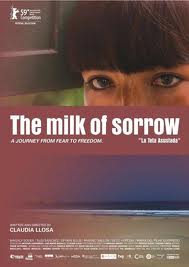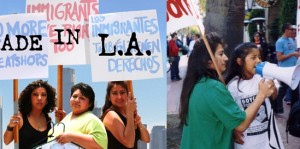La teta asustada / The Milk of Sorrow
Proyección de cine / film screening
ICNY-Auditorio 28 de marzo 6:30 pm
Fausta padece de ‘teta asustada’, una enfermedad que se trasmite por la leche materna de las mujeres que fueron violadas o maltratadas durante la guerra del terrorismo en Perú. La guerra acabó, pero Fausta vive para recordarla porque la enfermedad le ha robado el alma. De repente, la muerte de su madre le obligará a enfrentarse a sus miedos y al secreto que oculta en su interior. La película – Claudia Llosa. Perú, 2009. 99 min. – fue seleccionada por Perú como candidata al Oscar 2010 en la categoría de película de habla no inglesa.
In Spanish with English subtitles
Fausta suffers from “The Milk of Sorrow”, an illness transmitted through mother’s milk by women who have been violated or mistreated during the war of terrorism in Peru. The war has ended, but Fausta lives to remind of it because “the illness of fear” stole her soul. Now, her mother’s sudden death forces her to confront her fears and the secret that is hidden inside of her. The movie – Claudia Llosa. Perú, 2009. 99 min. – was selected as the Peruvian entry for the Best Foreign Language Film at Academy Awards in 2010
Consulta lo que nuestra biblioteca te ofrece en cine peruano
13th HAVANA FILM FESTIVAL NEW YORK
Cine Latinoamericano en NY
del 12 al 20 de abril
Comedia, cine de acción, documentales, cine infantil así como películas de y sobre pueblos indígenas de Guatemala, México y Colombia. Más de 40 películas de y sobre América Latina, el Caribe, los hispanos en USA. También cine argentino, chileno, cubano, dominicano, ecuatoriano, español, venezolano, etc. Con la colaboración del Instituto Cervantes NY. Películas con subtítulos en inglés
More than 40 highly anticipated and influential films from and about Latin America, the Caribbean, and Latinos in the U.S. including Argentina, Brazil, Chile, Colombia, Cuba, the Dominican Republic, Ecuador, Guatemala, Mexico, Spain, Puerto Rico, Venezuela, and the U.S will be in the festival’s five venues and 3 boroughs. They span a variety of genres and themes, ranging from comedy, thrillers, action, drama and documentaries to children’s tales, as well as films from and about indigenous peoples from Guatemala, Mexico, and Colombia. New partnership with the Instituto Cervantes. All foreign language films are subtitled in English
Más información: hffny.com; nyork.cervantes.es
Diana Vargas: press@dianavargas.com; 917-658-7735 / 917-668-7344¡ Entra en el catálogo y encontrarás la gran oferta de cine latinoamericano y español que está disponible en nuestra Videoteca !
‘La tierra de todos’ pase de película / ‘The Temptress’ film screening
ICNY – Auditorio, 22 de febrero. 6:00 pm
La tierra de todos / The Temptress
USA. Fred Niblo, 1926, 117 min.
Basada en una novela del español Vicente Blasco Ibáñez (Sangre y arena), ‘La tierra de todos’ fue el segundo largometraje de Greta Garbo en Hollywood y el film que estableció su personalidad magnética como una vampiresa que destruye la vida de aquellos hombres que no pueden ni quieren resistir sus encantos. La actriz encarna a una marquesa que, luego de algunos escándalos amorosos, decide afincarse en la Argentina, donde conoce a un joven arquitecto que caerá rendido ante sus encantos.
Based on a novel by the Spaniard Vicente Blasco Ibáñez (Sangre y arena), ‘La tierra de todos‘ was Greta Garbo’s second film in Hollywood and the one that established her magnetic character as a vampire who destroys the lives of those men who do not care to resist her charms. The actress plays a marquise who after some romantic scandals decides to settle in Argentina, where she meets a young architect who’ll fall under her charm. Mauritz Stiller, a Swedish filmmaker and Garbo’s mentor during her early years as an actress in Scandinavian film, who was responsible for the diva’s journey to the United States, was the first director of the film. But soon after shooting started, due to disagreements with the producers, he was replaced by Fred Niblo. Stiller would never again direct Garbo and died shortly after in Stockholm at the age of 45.



